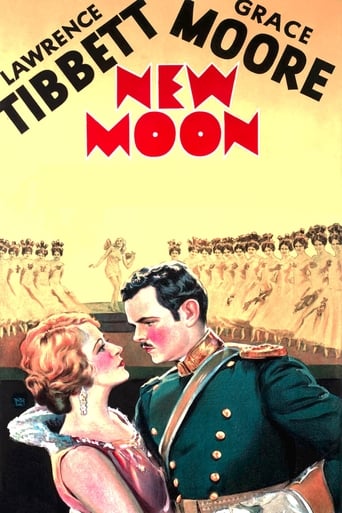

Wonderful film. It is a very early talkie and does not feel like an early film the acting is not wooden unlike many other early films and the singing is clear and crisp. Lawrence Tibbett (Captain Michael) plays a charming and sexy if I dare say so lover who charms his way into the heart of the beautiful and angelic voiced Princess Tanya (Grace Moore). I have scene both version of New Moon the Jeanette MacDonald & Nelson Eddy version that apparently had kept the original story line better. I still prefer the 1940 version but, New Moon 1930 gives you the glimpse into a rare talkie treat filled with wonderful songs and set in Russia!
... View MoreI do like operetta a lot, and I love Lawrence Tibbett not just for his unique voice in that it is powerful whatever register he sings in but also for his vivid and charismatic presence. Of the films he did, New Moon is my personal favourite with Metropolitan not close behind. I agree about the story, it is creaky, hokey and very ridiculous like the story of the operetta except in this case more so, and I also think the movie is too short. However, I do like the production values, especially the costumes, excepting the poorly shot climatic battle. The music is absolutely great, both songs and score, and there is some amusing dialogue and snappy pacing. Roland Young is delightfully droll, and Adolphe Menjou is a fine presence. Then we have Grace Moore, charming yet shrewish, she is my personal favourite of the leading ladies in the films of Lawrence Tibbett. As for Tibbett, aside from the delightful music and sweet romance, with his charisma and wonderful singing, he steals the picture. Overall, I like New Moon a lot, I tend to forget the creaky story, when the music, Moore and Tibbett are so good. 8/10 Bethany Cox
... View MoreI was a bit surprised when I noticed that the leading man (Lawrence Tibbett) looked an awful lot like John C. Reilly! See for yourself."New Moon" is an operetta starring two big-time opera singers of the era, Tibbett and Grace Moore. In many ways it's a lot like a Jeanette MacDonald and Nelson Eddy film, though Moore and Tibbett clearly had stronger voices and were singers first and movie stars second. Now I must admit that I hate films with this sort of singing and why I decided to see this film escapes me! On an ocean voyage during the latter days of Czarist Russia, the Lieutenant (Tibbett) meets the Princess (Moore). Despite the huge disparity in their social classes, the two quickly fall in love. However, when they reach port Moore goes off with her fiancé (Adolph Menjou) and seems to completely forget about Tibbett (what a creepy thing to do!). Clearly this lady is interested in marrying for money and prestige.When the fiancé meets the Lieutenant, he decides to get him out of the picture and assigns him to a fort in the middle of nowhere--and a very dangerous one at that. And, Moore does absolutely nothing--again, it's hard to like or respect her. Well, she actually does something--she whips him in the face!! And, you wonder why the film will end with them falling in love for good as per the formula)! I agree with the other reviewer that felt that Moore's character was totally unlikable!! And, as a result, the film seems oddly unromantic and a bit silly. But, being an MGM production, at least it looked nice and the singing, for what it was, was very good.By the way, if you do see the film, get a load of the battle sequences, as they are surprisingly brutal. I liked the guy hopping about on one leg during the height of battle.
... View MoreMGM scrapped the ridiculous plot of the 1928 Romberg-Hammerstein stage operetta and replaced it with an even more ridiculous one, with Russian lieutenant Lawrence Tibbett romancing Princess Grace Moore despite her engagement to nobleman Adolphe Menjou. It's the sort of movie where characters say things like, "The one attractive woman on this ship and she would be a princess!" And Moore isn't especially attractive; she's dowdy, looks oddly at the camera, and is got up in some genuinely bizarre MGM fashions. Her character is shrewish, too, so when Menjou dispatches Tibbett to some remote outpost to battle some menacing, vaguely Turkish insurgents, you really feel he's better off without her. An eternally suave and amusing Roland Young defuses some of the operetta silliness; but it's hard not to get the giggles when Tibbett, trying to rouse the troops, barks endless song cues -- "All right, can I have 20 brave men with me? Fifteen? How about 10?" -- before launching into "Stout-Hearted Men." The climactic battle is clumsily shot and unconvincingly run in fast motion, like a Mack Sennett comedy, and it's never really in doubt whether Tibbett will return to Moore in one piece (singing full-voice, of course, whatever his wounds). The ludicrous conventions that killed operetta are omnipresent. But the score's good, and the two opera-trained stars do give enthusiastically of themselves when called on to sing. That's what counts.
... View More